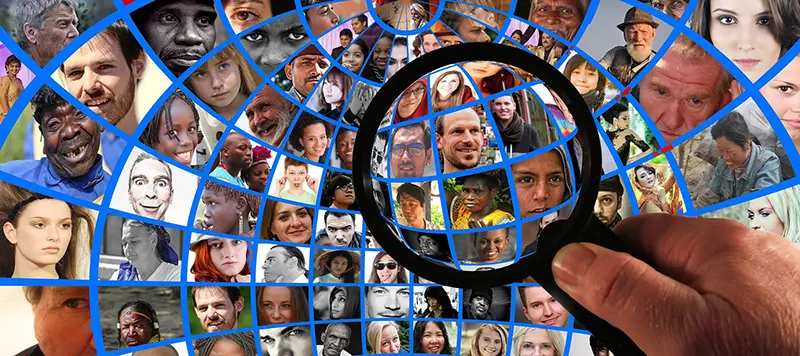Click here to get this post in PDF

The World Wide Web is getting wider by the minute, broader than we ever imagined it would be. Almost every person is now connected to the web through different forms of media and technologies. Now, facial recognition systems have become routine, used in several aspects of our daily lives.
It has become so typical that most of us fail to recognize its more profound implications. From surveillance in banks, ATMs, malls, and airports, even inside coffee shops and cafes, monitoring systems are everywhere. Most people unwittingly give up their privacy rights to their operations by opting for ‘Unlock using face’ features on their devices. There are dozens of examples where ordinary people willingly give up their privacy to social media apps, in the form of using video making services, posting their pictures on social media, etc.
Facial recognition systems are widespread. However, the majorities of the systems are still in their infancy and are not very accurate. This can cause more significant problems that we expected, and the implications of this are quite disturbing.
Quite recently, the police have taken up to using facial recognition systems and tools to catch suspects. However, as these systems are not very accurate, it often leads to wrongful accusations and even unlawful arrests. The truth is, the more often than not, the facial recognition tools are not giving out the right information at all.
Privacy rights and social media
Most of us have used some form of social media, at least at one point in our lives. Be it Instagram, Facebook, TikTok, video chatting apps, or picture editing apps. When we upload our pictures on these applications, we are giving up our data to these apps. It is straightforward for almost anyone to search us up and find our information online, without going through much hassle at all.
This data that they retrieve can be used for all kinds of malicious activities. We cannot do much about it if we are careless about sharing our personal information.
Privacy rights and Security systems
In today’s world, the words ‘privacy’ and ‘security’ are often interconnected. Surveillance systems use facial recognition systems to try and increase security. But, while doing so, we tend to forget that this is happening at the cost of our privacy.
A ‘Big Brother’ like situation has been created in many parts of the world. There are security systems such as CCTV, surveillance cameras, home security systems, etc. which are installed under the pretext of increasing our security and protection. However, these systems are also continually picking up and gathering our data without our consent. How this data is being used, and how it can be used maliciously, we do not know yet.
Privacy rights during the Covid-19 pandemic
Our worldview is being forced to change- very suddenly and very drastically. This change has been brought about as a consequence of the Covid-19 pandemic. One of the most significant changes that we get to see is the new ‘Work From Home’ situation. To be able to create an illusion of ‘normalcy,’ most of us are connecting with our colleagues, our peers, and our employees by using video calling services.
In many workplaces, keeping the webcam of the employee on throughout their working hours is considered the ‘norm.’ The fact remains that we are still working from home, which means we are still in our personal spaces. With our bosses watching over us during the day, are we getting any privacy, even in our own homes?
There has been a rising uproar regarding specific video calling apps, where user data and their privacy are being sold on the dark web markets for a nominal amount. While most people do not understand the implications of this, it is quite grim.
Most people have become normalized to using facial recognition systems due to their smartphones. However, the difference between using this technology on our smartphones and using it in public services is simple- one has our consent, while the other one does not.
Using facial recognition systems in public spaces creates a threat to the privacy rights of every single citizen. Companies, individuals on the internet, and even authorities are always at the luxury of picking up our information and creating a database of each individual by using these facial recognition systems.
The scary part of all this is that facial recognition systems are here to stay, at least for now. This means that most of us, willingly or unwillingly, are giving up our privacy rights. The data collected is used not merely for authentication but also for identification.
What is the solution to this privacy issue?
The only thing that can be done is to keep the regulations and checks in place, regularly. Facial recognition systems are going to grow now, especially in public spaces. The only way that ordinary citizens can even think of protecting their privacy rights is if these systems are implemented with more robust policies and regulations.
If you are the victim of cybercrime or facing privacy issues, you might want to seek legal advice. Contact a criminal lawyer to advise on the actions that can be taken depending on who the perpetrator is. In these unprecedented times, some of our lawyers are now offering video consultations.
5 Reasons Why Security Systems Are Important for Businesses
About the Author

Ali Panchoo – Digital Marketing Executive and content writer at Qredible.co.uk – an easy to use and trusted platform that enables people to find lawyers. Thorough understanding of social media, digital marketing and customer engagement with a proven ability to increase brand awareness, conceptualise and orchestrate marketing campaigns that effectively reinforce and build brand images. Developed engaging content to build a social media audience, including offers and competitions
Image Source: Pixabay.com
